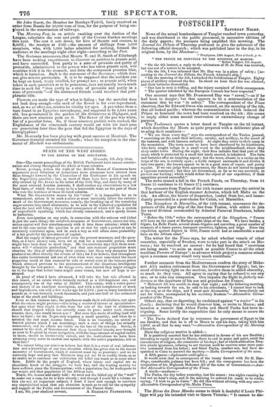STATE OF THE WEST INDIES.
TO THE EDITOR OF THE SPECTATOR.
Grenada, Sth July 1844. SIR—The recent proceedings of the British Parliament have caused conster- nation and dismay throughout the whole of these colonies. Never, perhaps, within the walls of the British House of Commons have arguments more fallacious or deductions more erroneous been uttered than those brought forward by the Chancellor of the Exchequer in his speech on the Sugar-duty question ; but, as most of these have been pointed out and ably refuted by Mr. INNEs in his letter of the 11th Slay, and since by many of the most eminent London journals, I shall confine my observations to a few local facts, of which there seems to be a lamentable want on the part of those who rule the destinies of these ill-fated colonies.
What Mr. GLADSTONE means by his " crisis " it is impossible for us to comprehend, unless it be such a crisis as must inevitably follow the entbrce- meat of the Government measures, namely, the breaking-up of the remaining sugar-estates into small allotments, to be sold to the Coloured population for what the land will bring; the natural consequence of which will be, a system of unprofitable squatting, which has already commenced, and a speedy return to barbarism.
Even immigration on any scale, in connexion with the ruinous and (what is just the same thing) the indefinite measures of Government, comes too late, sinless capital will flow simultaneously with it into these colonies : which will not be the case unless the question is set at rest for such a period as can be accurately calculated upon, and in such a way as will afford some probability of a fair profit for the investment of capital. Had the supply of labour preceded even the present measures, and the ques- tion, as I have already said, been set at rest for a reasonable period, much might have been done to meet them. Mr. GLADSTONE says that these rnea- sores will " stimulate production," and that non-resident proprietors must abandon the idea of cultivating their estates : but these very measures have produced an effect directly the reverse of this ; for I do believe, that throughout this entire Government not one of even what were once considered the finest properties could at this moment be sold or rented even at the ruinous prices which obtained previous to the announcement of the disastrous intelligence brought by the last packet. As things were, men fancied they might struggle on in the hope that better times might come round, but now all hope is de- stroyed.
In proof of what 1 have advanced, I will take the last sale effected in this island, of an estate which formerly ranked as a 200-hogshead one, and consequently was of the value of 25,0001. This estate, with a water-power and factory of an excellent description, and with a full complement of stock and implements, was sold a few weeks ago for 2,5001.; just as many hundreds of pounds as it was formerly worth thousands, and just one-half of the estimated value of the stock and buildings.
Even at this ruinous rate, the purchasers made their calculations, not upon what the estate might produce—this being a matter of chance or speculation— but upon what they might realize from the sale of the land in allotments, should that happen which has actually come to pass : under such circum- stances, then, a she would invest now ? But even this mode of selling land will have its limit ; for the Negro only requires a small quantity, and when he is satisfied the rest must become forest. This is no visionary, no unreal or fancied picture which I am describing; such a state of things has actually commenced, and its effects are visible on the face of the country. Surely, it cannot be the wish of Government that these beautiful islands, now brought NO near to England by steam navigation, with the large amount of capital vested in them, should be irretrievably ruined, and the institutions we have been straining every nerve to cherish and uphold, with the native population, left to their fate ?
We cannot bring our minds to believe but that it is a want of real informa- tion and a knowledge of our true situation which has given rise to the recent measures of Government, which if enforced must lay us prostrate ; and we do earnestly hope and pray that Ministers may yet see fit to modify them, so as to enable us to continue our cultivation till relief can reach us in some other form. Little do the people of England, where labour and capital are so abundant, know of the struggles we have Lad, and the wasting anxiety we have suffered, since the Emancipation ; with a population far, far inadequate to our wants, and that population of the African race. Truth, Sir, is soon and easily told : we need not the fabled cry of the "wolf" to make out a case, for he is here already ; and though I could fill a volume on this (to us) all important subject, I trust I have said enough to convince any unprejudiced mind that our situation is such as to call for the sympathy and support of the Public and Government of the Parent State.


























 Previous page
Previous page